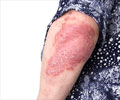A novel inhaled tuberculosis vaccine has been developed by scientists at the University of North Carolina at Chapel Hill (UNC) and Harvard that is easier to administer and store.
A novel inhaled tuberculosis vaccine has been developed by scientists at the University of North Carolina at Chapel Hill (UNC) and Harvard that is easier to administer and store. This vaccine along with its advantages is also as effective as the one commonly used around the world.
The research team said if the vaccine, which was successfully tested in guinea pigs, tests as well in humans, it could be a promising new weapon against tuberculosis.Scientists at the UNC School of Pharmacy led by Tony Hickey, Ph.D., insisted that the vaccine eliminates the need for refrigeration and water that has made the current vaccine problematic in some regions.
Hickey and his colleagues vetted a dry powder vaccine provided by Harvard University that is administered using an inhaler.
“It is at least as good as the injectable vaccine. The real advantage is that this vaccine does not need to be refrigerated. It also doesn’t require needles, syringes and water like the injectable vaccine, and administering it is as easy as breathing in, making it ideal for use in developing countries,” Hickey said.
The vaccine is spray dried instead of freeze dried. Spray drying is the process of spraying a liquid through a heated gas such as nitrogen to create a powder.
Traditional TB vaccines are freeze dried, requiring refrigerated storage and transportation, and a source of clean water to reconstitute the vaccine for injection. Spray dried vaccines do not need refrigeration or water to be used.
Advertisement
Hickey’s group specializes in developing drugs and vaccines that can be inhaled as a dry powder. The vaccine used in the study was a Bacillus Calmette-Guérin (BCG) vaccine, which is not common in the United States but is used extensively throughout the world. Given to 100 million infants annually, the current BCG vaccine for TB is the world’s most widely administered childhood vaccine.
Advertisement
He also believes that the successful test of this vaccine could affect the development of others.
“The results of this study are very exciting because there are other bacterial vaccines being developed that might benefit from this technology,” he said.
Tuberculosis is a respiratory illness that annually sickens 9 million people and kills up to two million, mostly in developing countries.
The results of the study are published in the Proceedings of the National Academy of Sciences.
Source-ANI
KAV/L











